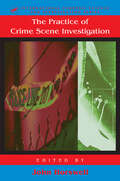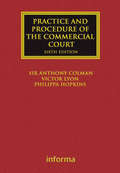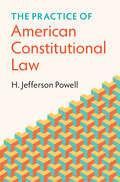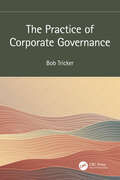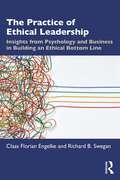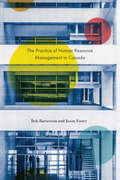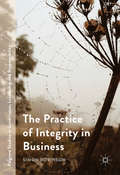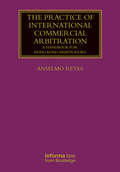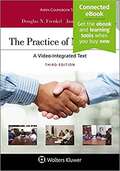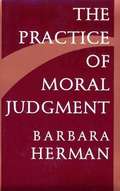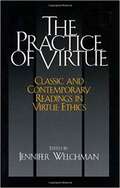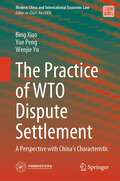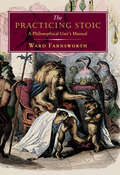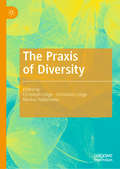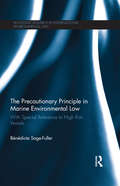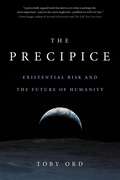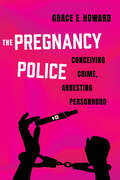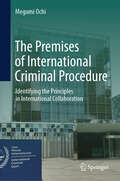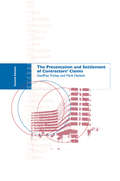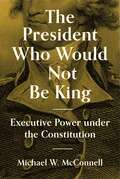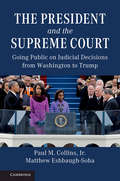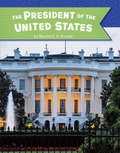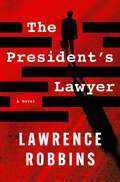- Table View
- List View
The Practice Of Crime Scene Investigation (International Forensic Science and Investigation)
by John HorswellThe Practice Of Crime Scene Investigation covers numerous aspects of crime scenes investigation, including the latest in education and training, quality systems accreditation, quality assurance, and the application of specialist scientific disciplines to crime. Written by authors specifically chosen for their expertise in this specialized field, the book includes discussion on fingerprinting, dealing with trauma victims, photofit technology, the role of the pathologist and ballistic expert, clandestine laboratories, and explosives. This comprehensive book is a valuable reference for everyone interested in forensic science and the broader application of the justice system.
The Practice and Procedure of the Commercial Court
by Anthony Colman Victor Lyon Philippa HopkinsPractice and Procedures of the Commercial Court is primarily intended as a reference for those who practice in the Court, it also sets those practices and procedures in context, including the Commercial Court’s history. It includes the principles and procedure for obtaining and discharging freezing injunctions and the procedures for The Court’s supervisory jurisdiction over arbitrations as well.
The Practice and Procedure of the Inter-American Court of Human Rights
by Jo M. PasqualucciIn a thoroughly revised second edition that incorporates the major changes made in the procedures and practice of the Inter-American Court since the original publication of this book, Jo M. Pasqualucci provides a comprehensive critique that is at once scholarly yet practical. She analyzes all aspects of the Court's advisory jurisdiction, contentious jurisdiction, and provisional measures orders through 2011. She also compares the practice and procedure of the Inter-American Court with that of the European Court of Human Rights, the Permanent Court of Justice, and the United Nations Human Rights Committee. She evaluates changes in the Rules of Procedure of the Inter-American Court that entered into force on January 1, 2010, and which substantially change the role of the Inter-American Commission in contentious cases before the Court. She also evaluates the challenges and means of State compliance with the Court's innovative reparations orders. Featuring revisions to every chapter to address the numerous new judgments, provisional measures, and orders adopted by the Court, this book will provide an important and updated resource for scholars, practitioners, and students of international human rights law.
The Practice of American Constitutional Law
by H. Jefferson PowellAmericans often think about constitutional law in terms of high-profile decisions by the Supreme Court – decisions that divide the justices by ideology, not law. This focus often leads to the erroneous conclusion that constitutional law arguments are, and can only be, political in substance. In The Practice of American Constitutional Law, H. Jefferson Powell demonstrates that there is a longstanding, shared practice of constructing and evaluating constitutional law claims that transcends current political disagreements. Powell describes how lawyers and judges identify constitutional problems by using a specifiable method of inquiry that enables them to agree on what the questions are, and thus what any plausible answer must address, even when disagreement over the most persuasive answers remains. Rather than being simply politics by other means, constitutional law is the successful practice of giving substance to the Constitution as supreme law.
The Practice of Corporate Governance
by Bob TrickerAll corporate entities, from the largest multinational conglomerate to the smallest tennis club, need effective governance. Some features of corporate governance are basic, common to all corporate entities: every governing body needs to think strategically and set policies to supervise ongoing management activities to ensure the entity is financially viable and is achieving its objectives. Every corporate entity has a governing body, whether it is called a board of directors, a committee, a council, or anything else. Many people, when appointed to the governing body of an organisation, have little idea of what to expect and what is expected of them. Even those with board-level experience find that the culture and leadership style of other governing bodies differ. The aim of this book is to help them understand and improve their contribution to the organisation and governing body they serve. The book is a simple guide to the work of every board member. Each chapter concludes with a worksheet, which enables readers to apply the ideas in that chapter to their own organisation. On completing the book, readers will have a detailed analysis of the governance of their own organisation. Effective governance improves performance and ensures long-term success. This book offers a straightforward guide to the fundamental work of governing bodies and the people who serve on them.
The Practice of Ethical Leadership: Insights from Psychology and Business in Building an Ethical Bottom Line
by Richard B. Swegan Claas Florian EngelkeThis book considers ethics as a practical discipline at the heart of decisions, reasoning, shaping, and ordering organizations. Both engaging and accessible, it offers effective suggestions for selecting and developing ethical leaders and invites readers to self-reflect and understand how to build ethical cultures within their organizations and beyond.Examining the many characteristics of ethical leadership, including love and authenticity, the book uses factual evidence to explore both its positive and negative characteristics. It offers readers an in-depth insight into how ethical decision making can help determine the right thing to do, supported by directly applicable ethical lessons that help leaders become more conscious going forward. The authors provide concrete suggestions for action, as well as ways to develop and understand what is needed to become an ethical leader. Each chapter encourages readers to reflect on their own experiences, as well as engage in discussion with others, and challenge basic assumptions. The book concludes by offering a long-term oriented outlook at future challenges for ethical leaders.Rooted in extensive psychological, philosophical, entrepreneurial, and business experience, The Practice of Ethical Leadership will appeal to leaders, human resource professionals, and Board members across a wide variety of organizations. This book will also benefit academics as well as anyone who is invested in the fields of leadership, management, business, and industrial-organizational Psychology.
The Practice of Human Resource Management in Canada (OPEL (Open Paths to Enriched Learning))
by Bob Barnetson Jason FosterThis introductory human resource management (HRM) textbook provides students with an overview of the major domains of human resource management (the “how-to”) with a focus on the practical application of the most recent HRM research and best practices. Students will learn to understand, anticipate, and respond to how power, profit, and intersectionality shape the practice of HRM. Moving beyond the typical procedure-oriented textbook, Barnetson and Foster provide thought-provoking political analysis to better prepare students for the real-world practice of human resource management.
The Practice of Integrity in Business (Palgrave Studies in Governance, Leadership and Responsibility)
by Simon RobinsonThis book explores the role of integrity in business and discusses why all leaders seek to have it. The author argues that it is less about ‘having’ integrity as an attribute, and more about practising it. The Practice of Integrity in Business examines how taking responsibility for ideas, values and practices, as well as accountability and wider creative responsibility for sustaining business, all contribute to the perceived integrity of an organization or business leader. Providing methods through which integrity can be learned, the author demonstrates the importance of practice, learning, dialogue and developing a narrative in forming the basis of trust. The book offers a view of integrity in which ideas, values and practice come together to make business and social sense, and to form the basis of mutual challenge and creativity.
The Practice of International Commercial Arbitration: A Handbook for Hong Kong Arbitrators (Lloyd's Arbitration Law Library)
by Anselmo ReyesFocusing on practical principles or guidelines for arbitrators, this book covers everything a prospective international commercial arbitrator should know about conducting an arbitration in Hong Kong. Specifically geared to those interested in or starting work as an international commercial arbitrator in Hong Kong, the book takes readers step-by-step through the problems that are likely to arise in the conduct of a commercial arbitration and in the development of their careers as international commercial arbitrators.
The Practice of Mediation (Aspen Coursebook Ser.)
by Douglas Frenkel James H. StarkThis widely-adopted, all-original book was the first in the field to combine complete analysis of the mediation process with integrated video case studies illustrating the full range of mediation skills. Engaging text is keyed to seven hours of online video, featuring three different cases, all based on actual disputes: a child custody case, a small claims consumer dispute, and a complex negligence suit. These unscripted mediations were conducted by mediators and lawyers with a variety of backgrounds and styles. The video includes an extended comparative example of facilitative and evaluative mediation of the same matter. The integration of text and video in The Practice of Mediation: A Video-Integrated Text, Third Edition enriches students’ understanding and allows classroom and clinical instruction to proceed more rapidly and on a far more sophisticated level. <P><P> New to the Third Edition: New end-of-chapter problems to aid assessment of student learning New or expanded coverage of biases and their impact on negotiators; pre-mediation contacts with parties; and increasing mediator use of caucuses to open the process Newly designed problems on the ethics of mediating New video clips on mediator influence and persuasion Professors and students will benefit from: Practice- and research-based analysis of negotiations and why they fail Contextualized model of the role and effective skills of the mediator, applicable across the entire range of disputes Exploration of fundamental norms of the process and, through real case problems, the ethics of mediating Video and case-based introduction to the role and skills of representing a client in mediation
The Practice of Moral Judgment
by Barbara HermanShe urges us to abandon the tradition that describes Kantian ethics as a deontology, a moral system of rules of duty. She finds the central idea of Kantian ethics not in duty but in practical rationality as a norm of unconditioned goodness. This book both clarifies Kant's own theory and adds programmatic vitality to modern moral philosophy.
The Practice of Shared Responsibility in International Law (Shared Responsibility in International Law)
by André Nollkaemper Ilias PlakokefalosThis is the third book in the series Shared Responsibility in International Law, which examines the problem of distribution of responsibilities among multiple states and other actors. In its work on the responsibility of states and international organisations, the International Law Commission recognised that attribution of acts to one actor does not exclude possible attribution of the same act to another state or organisation. Recognising that the applicable rules and procedures for shared responsibility may differ between particular issue areas, this volume reviews the practice of states, international organisations, courts and other bodies that have dealt with the issue of international responsibility of multiple wrongdoing actors in a wide range of issue areas, including energy, extradition, investment law, NATO-led operations and fisheries. These analyses jointly assess the fit of the prevailing principles of international responsibility and provide a basis for reform and further development of international law. Offers the broadest possible outlook of the practice of shared responsibility, reviewing the practice in thirty-nine specific issue areas of international law. No other single volume exists in which so many issue areas of international law have been analysed and collected. Provides unique insights and contributes to the understanding of how questions of shared responsibility have been dealt with in practice, in multiple different issue areas of international law.
The Practice of Virtue: Classic and Contemporary Readings in Virtue Ethics
by Jennifer WelchmanThis collection provides readings from five classic thinkers with importantly distinct approaches to virtue theory, along with five new essays from contemporary thinkers that apply virtue theories to the resolution of practical moral problems. Jennifer Welchman's Introduction discusses the history of virtue theory. A short introduction to each reading highlights the distinctive aspects of the view expressed.
The Practice of WTO Dispute Settlement: A Perspective with China’s Characteristic (Modern China and International Economic Law)
by Bing Xiao Yue Peng Wenjie YuThis book thoroughly reviews China’s participation in the WTO dispute settlement system with a focus on the interaction between China’s distinctive institutional characters and international legal regime and an aim of not only revealing the Chinese phenomenon but also identifying the Chinese mode and the rationale that lies behind China’s mode change. It further analyzes two fundamental issues China is confronted with. One is the distinctive member status issue of China due to the concurrence of its multiple member status as member state, accessing member state and developing member state. The other is the issue of invoking and applying the special rules of The Protocol on the Accession of China in the WTO dispute settlement. In-depth examination of assorted cases that involve China and representative individual cases thereof, is also provided. Upon the insight into Chinese phenomenon and Chinese issues in the WTO dispute settlement, the book tries to respond to the imminentneed of reforming the WTO dispute settlement regime by providing directions that accord with the regular pattern of evolution of international economic law system and pragmatic suggestions that stem from China’s strategic position.This book serves for academics, policymakers, and business practitioners by providing useful insights into the legal, regulatory, and economic issues raised by distinctive character of China in WTO dispute settlement.
The Practicing Stoic: A Philosophical User's Manual
by Ward FarnsworthStoicism is the most helpful and practical philosophy ever devised. Its intention is to help people find happiness by thinking differently about their lives and their problems. The advice the Stoics provided centuries ago is still the best anyone has offered, and it’s as useful today as it was then—or more. When anyone today says something really wise, the Stoics usually said it first. Today the word “stoicism” is often used to mean suffering without complaint, but the true ideas, and ideals, of the Stoics are far more powerful and interesting. Stoicism means knowing the difference between what we can control and we can’t, and not worrying about the latter. The Stoics were masters of perspective, always taking the long view while remembering that life is short. And they were deep and insightful students of human nature, understanding how we manage to make ourselves miserable as well as how we seek and can find fulfillment. The great insights of the Stoics are spread over a wide range of ancient sources. This book brings them all together for the first time. It systematically presents what the various Stoic philosophers said on every important topic, accompanied by an eloquent commentary that is clear and concise. The result is a set of philosophy lessons for everyone—the most valuable wisdom of ages past made available for our times, and for all time.
The Praxis of Diversity
by Christiane Lütge Christoph Lütge Markus FaltermeierThis edited collection brings together experts from various disciplines to engage critically with diversity theory, diversity politics, and their practical application. Accordingly, the volume provides a provocative discursive space, where the key theoretical as well as practical problems of diversity in business, institutions and culture can speak to each other and can be assessed. The aim is to bridge the gap between two relatively distinct discourses: the discourse on practical applications of diversity concepts and the discourse on theoretical approaches to diversity. This selection of articles delivers the first step towards achieving this goal. Approaching diversity from a business perspective, the chapters discuss its ramifications on democratic institutions and theory, as well as point to its relevance in didactic and educational settings.
The Precautionary Principle in Marine Environmental Law: With Special Reference to High Risk Vessels (Routledge Research in International Environmental Law)
by Bénédicte Sage-FullerThe book examines whether the jurisdiction of coastal States under international law can be extended to include powers of intervention towards vessels posing a significant risk to their coastal and marine environment, but which have not yet been involved in any incident or accident. The books sets out how it is that coastal State jurisdiction can indeed be seen as including powers of intervention towards High Risks Vessels before an incident or accident happens, on the basis of the precautionary principle. The precautionary principle requires taking action when a risk of damage to the environment is suspected, but cannot be confirmed scientifically.The book thus considers the potential opportunities for the coastal state under international law to regulate international shipping where they consider vessels to an unacceptable risk to the environment, in order to prevent or minimise the risk of occurrence of the accident or incident leading to damage. The book acknowledges that this puts into question some very old and established principles of the law of the sea, most importantly the principle of freedom of navigation. But Bénédicte Sage-Fuller contends that this change would itself be a consequence of the evolution, since the end of WWII, of on the one hand international law of the sea itself, and of international environmental law on the other hand.
The Precipice: Existential Risk and the Future of Humanity
by Toby OrdThis urgent and eye-opening book makes the case that protecting humanity's future is the central challenge of our time. If all goes well, human history is just beginning. Our species could survive for billions of years - enough time to end disease, poverty, and injustice, and to flourish in ways unimaginable today. But this vast future is at risk. With the advent of nuclear weapons, humanity entered a new age, where we face existential catastrophes - those from which we could never come back. Since then, these dangers have only multiplied, from climate change to engineered pathogens and artificial intelligence. If we do not act fast to reach a place of safety, it will soon be too late. Drawing on over a decade of research, The Precipice explores the cutting-edge science behind the risks we face. It puts them in the context of the greater story of humanity: showing how ending these risks is among the most pressing moral issues of our time. And it points the way forward, to the actions and strategies that can safeguard humanity. An Oxford philosopher committed to putting ideas into action, Toby Ord has advised the US National Intelligence Council, the UK Prime Minister's Office, and the World Bank on the biggest questions facing humanity. In The Precipice, he offers a startling reassessment of human history, the future we are failing to protect, and the steps we must take to ensure that our generation is not the last.
The Pregnancy Police: Conceiving Crime, Arresting Personhood (Reproductive Justice: A New Vision for the 21st Century #10)
by Grace E. HowardDecades before the overturning of Roe v. Wade, pregnant people faced arrest and prosecution for supposed crimes against the fertilized eggs, embryos, and fetuses they gestated. The Pregnancy Police investigates the legal arguments undergirding these prosecutions and sheds much-needed light on the networks of health-care providers, social workers, and legal personnel participating in this ongoing surveillance and punishment of pregnant people. Drawing on detailed analyses of legislation, statements from prosecutors and law enforcement, and records from over a thousand arrest cases, Grace E. Howard traces the long history of state attempts to regulate and control people who have the capacity for pregnancy—from the early twentieth century's white supremacist eugenics to the end of Roe and the ever-increasing criminalization of abortion across the United States.
The Premises of International Criminal Procedure: Identifying the Principles in International Collaboration
by Megumi OchiHow does international criminal procedure differ from any domestic legal principles and why? What premises of international criminal procedure do give rise to such differences? Can we provide any unified socio-legal explanation for the differences between the procedure of the International Criminal Court and the domestic legal principles? This boils down to the question: what are the premises inherent in international criminal procedure? Applying the premise theory of general principles of law, this book conducts a comparative analysis of various general principles of international criminal procedure with corresponding principles that are valid domestically and in general international law and identifies special premises in the procedural law of the ICC. This book discloses the four points that have not been identified in previous studies. (A) the fact that the value of international criminal procedure frequently mentioned in previous studies has not actually had much of an impact: (i) the premise of “seriousness of the core crime” has little influence at the procedural level; and (ii) the premise of deterring illegal investigations has little impact. (B) the factors that have not been recognized as circumstances or values on which international criminal procedure is premised in previous research significantly influence international criminal procedure: (iii) the entire procedure is based on the primitive premise of speed and “first come, first served”; and (iv) the impact of the premise of consideration for national sovereignty, which is associated with the fact that the ICC is an international organization based on a treaty, is critical. The ICC's institutional premises of the value of expeditiousness and lacking centralized control over its “limbs” have had a significant impact on the various aspects of international criminal procedure.
The Presentation and Settlement of Contractors' Claims - E2
by Mark Hackett Geoffrey TrickeyContractual disputes, often involving large sums of money, occur with increasing frequency in the construction industry. This book presents - in non-legal language - sound professional advice from a recognized expert in the field on the practical aspects of claims. This edition has been brought right up to date by taking into account legal decisions promulgated over the last 17 years, as well as reflecting the effect of current inflation on claims. The new edition is based on the 1998 JCT contract. *Fully updated second edition of this practical guide. *Worked examples to back up the advice offered and relate it to practitioners' experience.
The President Who Would Not Be King: Executive Power under the Constitution (The University Center for Human Values Series #48)
by Michael W. McConnellVital perspectives for the divided Trump era on what the Constitution's framers intended when they defined the extent—and limits—of presidential powerOne of the most vexing questions for the framers of the Constitution was how to create a vigorous and independent executive without making him king. In today's divided public square, presidential power has never been more contested. The President Who Would Not Be King cuts through the partisan rancor to reveal what the Constitution really tells us about the powers of the president.Michael McConnell provides a comprehensive account of the drafting of presidential powers. Because the framers met behind closed doors and left no records of their deliberations, close attention must be given to their successive drafts. McConnell shows how the framers worked from a mental list of the powers of the British monarch, and consciously decided which powers to strip from the presidency to avoid tyranny. He examines each of these powers in turn, explaining how they were understood at the time of the founding, and goes on to provide a framework for evaluating separation of powers claims, distinguishing between powers that are subject to congressional control and those in which the president has full discretion.Based on the Tanner Lectures at Princeton University, The President Who Would Not Be King restores the original vision of the framers, showing how the Constitution restrains the excesses of an imperial presidency while empowering the executive to govern effectively.
The President and the Supreme Court: Going Public on Judicial Decisions from Washington to Trump
by Matthew Eshbaugh-Soha Paul M. Collins, JrWhen presidents take positions on pending Supreme Court cases or criticize the Court's decisions, they are susceptible to being attacked for acting as bullies and violating the norm of judicial independence. Why then do presidents target Supreme Court decisions in their public appeals? In this book, Paul M. Collins, Jr and Matthew Eshbaugh-Soha argue that presidents discuss the Court's decisions to demonstrate their responsiveness to important matters of public policy and to steer the implementation of the Court's decisions. Using data from Washington to Trump, they show that, far from being bullies, presidents discuss cases to promote their re-election, policy goals, and historical legacies, while attempting to affect the impact of Court decisions on the bureaucracy, Congress, the media, and the public.
The President of the United States (U.S. Government)
by Martha E. RustadWhat does the President of the United States do? Learn about the president's duties, the White House, how the President is elected, and more. Descriptive main text, full-color photos, fast facts, and callout definitions work together to support understanding.
The President's Lawyer: A Novel
by Lawrence RobbinsA Washington, DC, litigator is hired to defend his best friend, the former President of the United States, against a murder charge in this novel that is &“clever and thrilling with a shocking twist&” (People).After a long career as one of DC&’s most powerful litigators, Rob Jacobson is faced with the case of a lifetime: the former President of the United States—his childhood best friend—has been accused of murdering his mistress. Rob knows he&’s the only one who can prove his friend&’s innocence, but he is soon overwhelmed as he attempts to devise a strategy to defend an authoritative man with a taste for infidelity, serious anger issues, and unconventional sexual appetites. As the high-profile case unfurls, the troubled, intertwining pasts of the two men complicate Rob&’s efforts and soon, doubts begin to grow in his head. Could his oldest friend truly be capable of murder or is something even darker at play? &“Robbins...keeps the pace fast and the courtroom scenes convincing&” (The New York Times Book Review) in this sensational thriller by a true DC legal insider.
